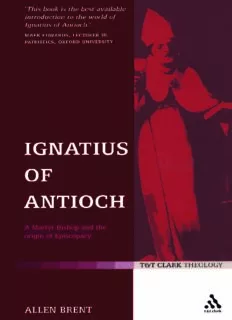
Ignatius of Antioch: A Martyr Bishop and the Origin of Episcopacy PDF
Preview Ignatius of Antioch: A Martyr Bishop and the Origin of Episcopacy
Ignatius of Antioch Ignatius of Antioch A Martyr Bishop and the Origin of Episcopacy Allen Brent continuum Published by T8T Clark International A Continuum imprint The Tower Building, 11 York Road, London SE1 7NX 80 Maiden Lane, Suite 704, New York, NY 10038 www.tandtclark.com All rights reserved. No part of this publication may be reproduced or transmitted in any form or by any means, electronic or mechanical, including photocopying, recording or any information storage or retrieval system, without permission in writing from the publishers. Copyright© Allen Brent, 2007 Allen Brent has asserted his right under the Copyright, Designs and Patents Act, 1988 to be identified as the Author of this work. British Library Cataloguing-in-Publication Data A catalogue record for this book is available from the British Library Typeset by Fakenham Photosetting Limited, Fakenham, Norfolk EISBN 9780567032003 Caroline Penrose Bammel, FBA Inpiam memoriam Contents Preface ix Abbreviations xi 1 The Recovery of Ignatius' Genuine Letters 1 2 Ignatius' Personal History and the Church at Antioch 14 3 The Choreography of the Martyr Procession 44 4 Martyr Procession and Eucharist: The Christian Mysteries 71 5 Recent Attacks on the Authenticity of the Ignatian Letters 95 6 Ignatius and Polycarp 144 7 In Conclusion 159 Select Bibliography and Further Reading 163 Index 169 vu Preface Since the immediate aftermath to the Reformation in the West, the letters of Ignatius of Antioch have proven a subject for continuing controversy. Eusebius claimed that Ignatius had been, with Polycarp, a companion of the apostles, and that his putative date made his writing immediately consequent to the believed dates of the New Testament documents. Ignatius thus became a crown witness for the historic demand that churches should be ruled by bishops who are the successors both to the apostles and to the ministry entrusted to them. But clearly the letters had experienced a long and complex reception history even before the Reformation which adds to their mystery. Such was the perceived importance of these documents that what appears to have been their original edition was consid- erably expanded, and its Christology significantly modified, in the course of the fourth and fifth centuries. Furthermore, new letters forged in Ignatius' name were added to bring the original seven up to a total of 13. Neither the original edition, nor its expansion, nor its forged additions were to lack patristic citations as the centuries rolled on. But what of the original edition that we know today as the 'middle recension' because of a short, abbreviated Syriac version discovered in the nineteenth century? Since the time of Archbishop James Ussher and Nicolaus Vedelius in the seventeenth century, and their arguments with Presbyterian and Puritan divines such as John Milton, controversy has raged over the authenticity of the middle recension. Was Eusebius wrong to date the correspondence so early, and was not Ignatius a fictional character created in order to give substance to a later church order that had nothing to do with the age IX
Description: